Related Research Articles

William Ballard Doggett was an American pianist and organist. He began his career playing swing music before transitioning into rhythm and blues. Best known for his instrumental compositions "Honky Tonk" and "Hippy Dippy", Doggett was a pioneer of rock and roll. He worked with the Ink Spots, Johnny Otis, Wynonie Harris, Ella Fitzgerald, and Louis Jordan.
Gary Ronnie Stewart was an American musician and songwriter, known for his distinctive vibrato voice and his outlaw country sound influenced by southern rock. At the height of his popularity in the mid-1970s, Time magazine described him as the "king of honkytonk." He had a series of country chart hits from the mid- to late 1970s, the biggest of which was "She's Actin' Single ", which topped the U.S. country singles chart in 1975.
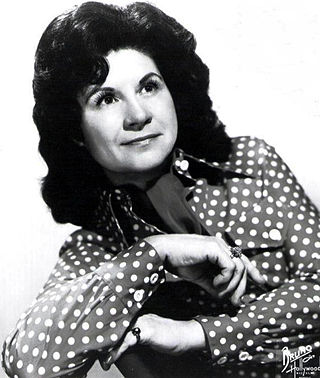
Ellen Muriel Deason, known professionally as Kitty Wells, was an American pioneering female country music singer. She broke down a barrier for women in country music with her 1952 hit recording "It Wasn't God Who Made Honky Tonk Angels", which also made her the first female country singer to top the U.S. country charts and turned her into the first female country superstar. “It Wasn’t God Who Made Honky Tonk Angels” would also be her first of several pop crossover hits. Wells is the only artist to be awarded top female vocalist awards for 14 consecutive years. Her chart-topping hits continued until the mid-1960s, paving the way for and inspiring a long list of female country singers who came to prominence in the 1960s.

Michael Webb Pierce was an American honky-tonk vocalist, songwriter and guitarist of the 1950s, one of the most popular of the genre, charting more number one hits than any other country artist during the decade.
"City Lights" is an American country music song written by Bill Anderson on August 27, 1957. He recorded it on a small Texas label called TNT Records in early 1958 to little acclaim. The song was first cut by Anderson in 1957 at the campus of the University of Georgia. In June 1958, Ray Price recorded it and his version hit number 1 on the Billboard Hot Country Songs singles chart in August 1958. Mickey Gilley's version also hit number 1 in June 1975.
"Honky-Tonk Man" is a song co-written and recorded by American singer Johnny Horton. It was released in March 1956 as his debut single on Columbia Records, and the album of the same name reaching number 9 on the U.S. country singles charts. Horton re-released the song six years later, taking it to number 11 on the same chart.

"Why Baby Why" is a country music song co-written and originally recorded by George Jones. Released in late 1955 on Starday Records and produced by Starday co-founder and Jones' manager Pappy Daily, it peaked at 4 on the Billboard country charts that year. It was Jones' first chart single, following several unsuccessful singles released during the prior year on Starday.
"Honky Tonkin'" is a 1947 country music song, written and recorded by Hank Williams. His song went to #14 on the Billboard country music chart in 1948. In 1982, it became the sixth chart topping single for Williams' son, Hank Williams Jr.
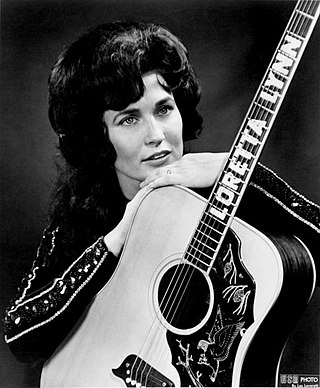
The discography of American country music singer-songwriter Loretta Lynn includes 50 studio albums, 36 compilation albums, two live albums, seven video albums, two box sets and 27 additional album appearances. Briefly recording with the Zero label, she signed an official recording contract with Decca Records in 1961, remaining there for over 20 years The first under the label was her debut studio album Loretta Lynn Sings (1963). It peaked at number two on the Billboard Top Country Albums survey. Lynn would issue several albums a year with her growing success, including a duet album with Ernest Tubb (1965), a gospel album (1965), and a holiday album (1966). Her seventh studio album You Ain't Woman Enough (1966) was her first release to top the country albums chart and to chart within the Billboard 200. Other albums to reach number one during this period were Don't Come Home a Drinkin' (1967) and Fist City. Don't Come A'Drinkin would also become Lynn's first album to certify gold by the Recording Industry Association of America (RIAA).
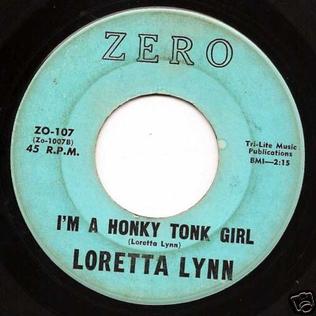
"I'm a Honky Tonk Girl" is the debut single by American country music artist Loretta Lynn, released in March 1960. The song was among the first to not only be recorded by Lynn, but also to be penned by her. She composed the song while living in Washington State, maintaining her role as a housewife and occasional member of a local country music band. The composition was later recorded in California after Lynn was given money by a local businessman, who was impressed by her singing. "I'm a Honky Tonk Girl" was then issued as a single under the newly founded and independent Zero Records label in March 1960.
"Second Honeymoon" is a song originally recorded by Johnny Cash. It was written for him by Autry Inman.
"Honky-Tonk Girl" is a song co-written and originally recorded by Hank Thompson. Released by him on Capitol Records in 1954, it was a nationwide country hit in the United States that year.
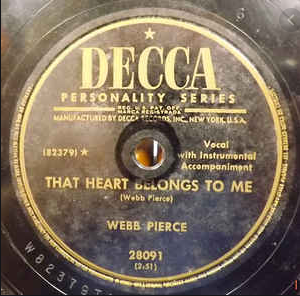
"That Heart Belongs to Me" is a country music song written and recorded by Webb Pierce. It was released in 1952 on the Decca label. In June 1952, the song reached the No. 1 spot on the Jockey chart. It peaked at No. 2 on the Juke Box chart and No. 5 on the Best Seller chart. In Billboard's year-end country chart for 1952, it ranked No. 20.

Webb Pierce is an album from honky-tonk singer Webb Pierce that was released in October 1955 on the Decca label. AllMusic gave the album four-and-a-half stars.
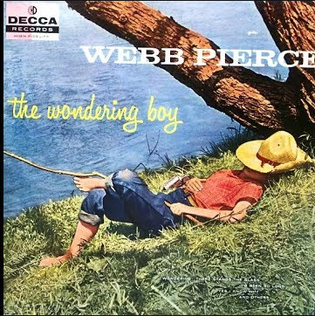
The Wondering Boy is an album from honky-tonk singer Webb Pierce that was released in August 1956 on the Decca label. Stephen Thomas Erlewine of AllMusic called the album "one of his best albums of the '50s" with a "dynamite" track sequence.

Just Imagination is an album from honky-tonk singer Webb Pierce that was released in 1958 on the Decca label. It was Pierce's third album, following the success of Webb Pierce (1955) and The Wondering Boy (1956).

Webb! is an album by Webb Pierce that was released in 1959 on the Decca label. He was accompanied on the album by Owen Bradley and His Orchestra. Stephen Cook of AllMusic noted: "Topped off with Owen Bradley's clean musical backing, Webb! is a rare gem from the days before Pierce and his honky tonk kind were squeezed out by crossover country's arrival on the scene."
"Honky Tonk Song" is a country music song recorded by Webb Pierce. The song was co-written by Mel Tillis and Buck Peddy. It was released in 1957 on the Decca label.

There Stands the Glass is a studio album by country music singer Carl Smith. It was released in 1964 by Columbia Records. The album consists of Smith's covers of songs made famous by Webb Pierce.
References
- 1 2 Joel Whitburn (1996). The Billboard Book of Top 40 Country Hits. Billboard Books. p. 245. ISBN 0823076326.
- ↑ "Best Selling Country & Western Records -- 1946-1955". The Billboard. March 3, 1956. p. 58.
- ↑ "Webb Pierce". Discogs. 27 October 1955. Retrieved November 30, 2020.
- ↑ "The Wondering Boy (1951-1958)". AllMusic. Retrieved November 30, 2020.
- ↑ "King of the Honky-Tonk: From the Original Master Tapes". AllMusic. Retrieved November 30, 2020.
- ↑ "The Guitar Genius". AllMusic. Retrieved November 30, 2020.
- ↑ "Mona Lisa". AllMusic. Retrieved November 30, 2020.
- ↑ "Cute 'n' Country". AllMusic. Retrieved November 30, 2020.
- ↑ "Don Gibson – That Gibson Boy". Discogs. Retrieved November 30, 2020.
- ↑ "Big Fifteen". AllMusic. Retrieved November 30, 2020.
- ↑ "Caught in the Webb: A Tribute to the Legendary Webb Pierce". AllMusic. Retrieved November 30, 2020.